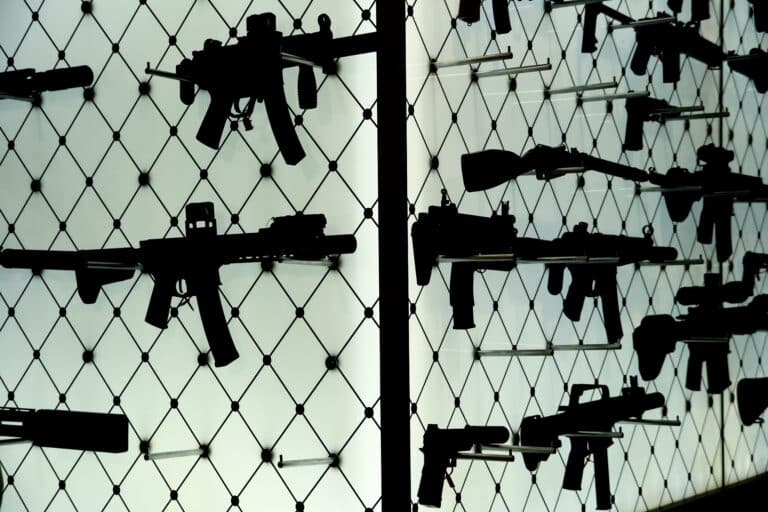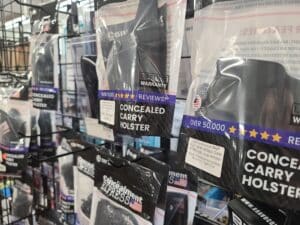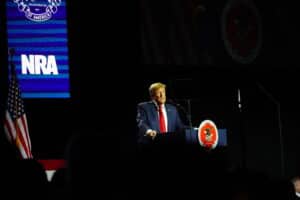Donald Trump won the presidency, the number of silencers in civilian circulation climbed above 4.8 million, and a major medical group just endorsed their usefulness as hearing safety devices. But will any of that translate to silencer restrictions being relaxed in the coming months or even years?
Removing sound suppressors, often called silencers despite not truly silencing the sound of a gunshot, from the purview of the National Firearms Act (NFA) in order to make them easier for the average person to buy has been a top priority of the gun-rights movement for well over a decade now. As things stand now, anyone looking to purchase a suppressor would need to pass an FBI background check, pay a $200 tax to the ATF, and submit a registration of the device as proof of payment. Advocates want to remove most of those steps.
There are several avenues they could take to get to that endpoint. All of them may have received a boost this month with the help of a position statement from a major medical group backing their usefulness in preventing hearing loss.
“Sound suppressors are mechanical devices attached to the barrel of a firearm designed to reduce harmful impulse noise of firearms at its source,” the American Academy of Otolaryngology–Head and Neck Surgery (AAO-HNS) statement reads. “CDC research has shown that ‘The only potentially effective noise control method to reduce [shooters’] noise exposure from gunfire is through the use of noise suppressors that can be attached to the end of the gun barrel.’ Suppressors reduce muzzle blast noise by up to 30 dB.”
So, let’s look at the possibilities for reform and the likelihood they succeed.
The Hearing Protection Act
The highest-profile option for suppressor deregulation is legislation. It’s also the one that’s been the main focus of reform efforts for nearly a decade. Dr. Tim Wheeler, who introduced the AAO-HNS statement, is hoping the group’s new position will help get the Hearing Protection Act through the next Congress.
“It’s purely a scientifically based observation that’s going to be powerful evidence for when the Hearing Protection Act is brought up again,” Wheeler told The Reload. “If you oppose making this useful firearm accessory available to people who can benefit from it, then you are opposing protecting them from hearing loss.”
That could increase support for the bill, which is already the most popular pro-gun legislation. Donald Trump’s backing could help solidify support, especially among Republicans. While he said he’d “seriously look” at banning suppressors after the 2019 Virginia Beach shooting, he has since promised to sign the Hearing Protection Act if it makes it to him.
Still, it’s not clear that will be enough to get it to his desk.
First off, though the backing of the largest ear doctor group helps provide legitimacy to the claim suppressors serve a safety purpose for shooters, the argument isn’t new. After all, the bill that’s been floating around in Congress for years is named after it. And that hasn’t been enough to get it through even one House of Congress to date.
That’s partially because opposition to the bill hasn’t centered on disputing the idea that suppressors reduce the harmful noise produced by gunshots. If anything, the opposition pushes the same argument much further. Gun-control activists mainly argue suppressors are too good at reducing the sound of gunfire.
“The loud and distinctive noise that a gun makes is one of its most important safety features: when people hear it, they realize they may need to run, hide, or protect others,” Everytown wrote in opposition to the bill in 2018. “In mass shootings, being able to hear and identify the gunshots can mean the difference between life and death.”
Additionally, they argue suppressors are unnecessary for hearing protection.
“The gun lobby presents this legislation as an attempt to protect shooters’ hearing, but silencers are not the most effective or the safest way to do so,” Everytown wrote. “Widely available ear protection products work better than silencers to protect hearing and safety—which is why the U.S. military relies on them, not silencers, to protect soldiers’ hearing.”
And, while Trump’s support for suppressor reform could galvanize Republican support, it could do the exact opposite for Democrats. Not that either side really needs much of a push to go in those respective directions, given the increasing polarization around guns in recent years. So, clearing the 60-vote requirement to overcome an inevitable filibuster in the Senate is extremely unlikely.
However, the Hearing Protection Act may not even make it through the Republican-controlled House. After all, it didn’t make it through the Republican-controlled House over the past two years. Nor did it make it through the one Trump enjoyed at the beginning of his first term.
In fact, the latest version of the bill only managed to get 70 cosponsors in the House and 29 in the Senate. That’s not promising for how it will perform in the next Congress, where Republicans will have four more senators but, likely, the exact same number of congressmen.
Even if Republicans were able to frame the bill in a way that would make it fit into the budget reconciliation process, which only requires 50 votes to get through the Senate, they might not be able to get the votes. Although, it would probably depend on how effectively gun-rights advocates could pressure Republicans into siding with them. The bigger hurdle, though, would be in getting Republicans to view the bill as important enough to try and ram through reconciliation.
Another option is to try and paperclip it into a larger, more important bill. The closest the Hearing Protection Act has ever come to passing was back in 2018 when it was part of the Sportsmen’s Heritage And Recreational Enhancement (SHARE) Act before it was derailed by the Las Vegas shooting. Perhaps aiming a bit higher and including it in some kind of must-pass bill could work, but that’s a tall order.
Federal rulemaking or Other Executive Branch Moves
The next possibility is using federal rulemaking or executive orders to change how the ATF enforces NFA suppressor regulations. This is another area where the AAO-HNS’s statement on their use as a safety device could be a justification for changes or reinterpretation.
On the simpler end, Trump could order the ATF to prioritize speedy processing of suppressor registrations to further reduce the time it takes for lawful buyers to obtain the devices. On the more substantial end, he could order them to come up with a new federal rule for silencer enforcement. He might even be able to partially eliminate the tax stamp requirement using a similar amnesty program to the one Joe Biden’s administration employed as an incentive to get Americans to register their pistol-braced guns under one of his rules.
Ironically, though, the Biden Administration’s ATF rulemaking may hinder any effort to reinterpret federal firearms law. Those rules have had a lot of trouble in the lower courts when they feature the ATF making significant departures from how they used to interpret laws that haven’t changed. A radical reinterpretation of suppressor regulations could face stiff opposition in court.
Legal Challenges
The last avenue for removing most of the regulations on suppressors is through lawsuits. The AAO-HNS statement could help convince a judge. However, the recent report from the National Shooting Sports Foundation showing that Americans now own more than 4.8 million might be even more useful for gun-rights activists.
While the Supreme Court hasn’t set a hard number on what exactly constitutes “common use” when determining if an arm is protected by the Second Amendment, 4.8 million is certainly a heck of a lot of suppressors. Justice Samuel Alito estimated there were only about 200,000 stun guns in his concurrence in Caetano v. Massachusetts, where he argued that was enough to reach the common use threshold. So, maybe lower court judges and SCOTUS itself will agree suppressors are in common use and the restrictions on them violate the Second Amendment.
However, challenging suppressor regulations hasn’t been a top priority of gun-rights activists to this point. NFA challenges generally haven’t had much success either. And, in order to have the best shot at winning, a case would probably need a plaintiff who has actually been charged with violating suppressor regulations–a pretty rare charge.
Still, this is also another area Trump and the new GOP Congress could have an impact without even focusing on it. Simply appointing new federal judges who view the Second Amendment similarly to the ones he elevated in his first term will likely make a suppressor suit more viable.
So, it’s not necessarily a slam dunk. But it is an increasingly viable path to undoing suppressor restrictions. It might even be the most viable path.






